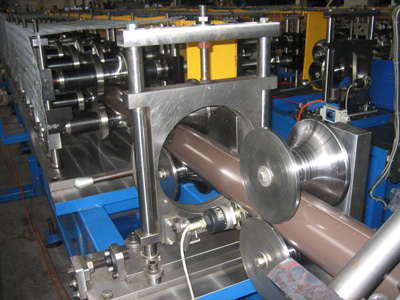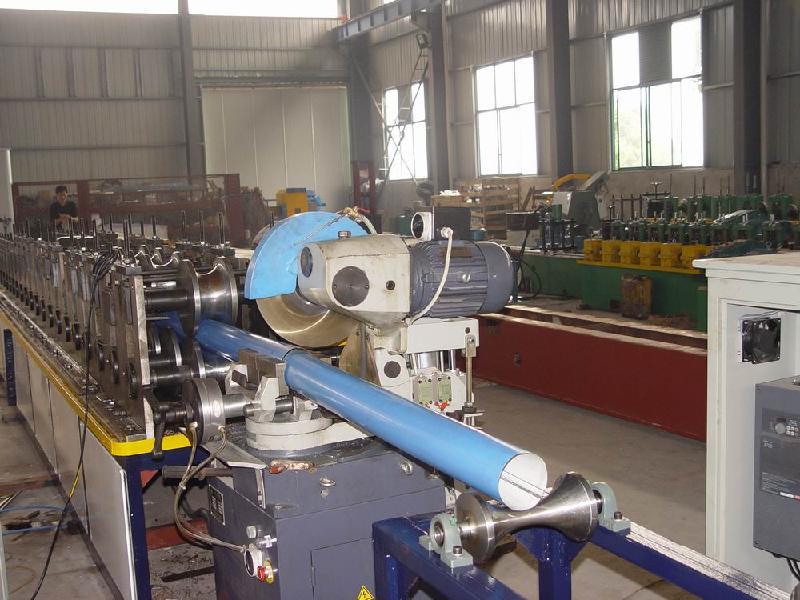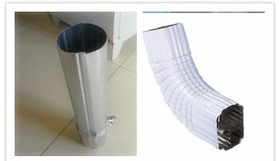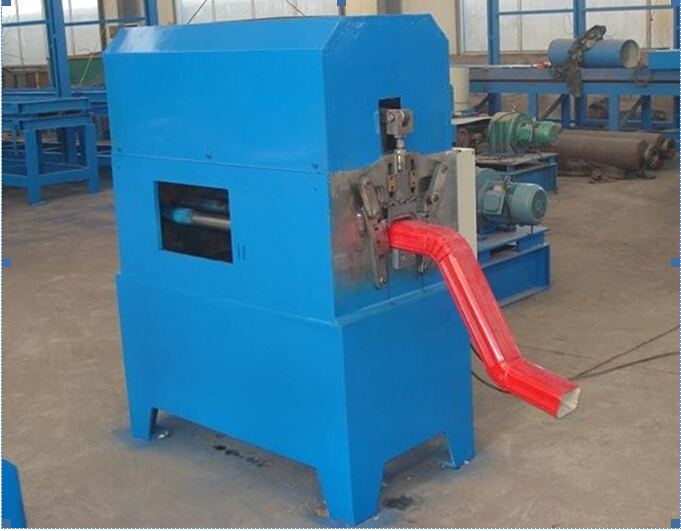Round Downpipe Roll Forming Machine is used for building, it can as rain gutter uses.
This machine includes one set decoiler, guiding equipment, main roll forming machine, PLC control system, hydraulic cutting and receving table.
It has two cutting modes: flying saw cutting and mould cutting.
Specifications:
Decoiler - Feeding guide - Main roll forming machine - PLC control system - Hydraulic cutting - Receiving table
Pictures of machine:
Training and Installation : Round Downpipe Roll Forming Machine Round Downpipe Roll Forming Machine,Gi Round Downpipe Roll Forming Machine,Gl Round Downpipe Roll Forming Machine,Round Downpipe Roll Cold Forming Machine YingYee Machinery and Technology Service Co.,Ltd , https://www.yingyee.cn
Electronic water meters are increasingly favored by users due to their powerful management functions and certain measurement performance indicators. For a long time, China’s water supply industry has mainly used mechanical water meters, especially large-diameter water meters, which are usually installed outdoors, and suffer from sunlight, rain, blisters, and wind. The working environment is rather harsh, but mechanical water meters can adapt to this. environment of. However, electronic water meters are not the case. Electronic components are most afraid of water, and they are afraid of extreme temperature changes. The harsh environment is a serious challenge for electronic water meters. There seems to be a consensus in the industry that only by solving the problem of the environmental adaptability of electronic water meters can we achieve the goal of replacing electronic water meters with mechanical water meters.
Therefore, the waterproof capability of electronic water meters is a difficult task that various manufacturers try to overcome. It should be said that so far, no one has dared to say to the chest - I have completely overcome.
The water meter industry simplifies this problem as a shell protection design and determines the IP rating of the enclosure in accordance with GB4208-2008 “Enclosure Protection Levelâ€. Many manufacturers believe that if the IP68 protection level is achieved, electronic water meters can continuously work underwater and meet the requirements for harsh environments.
IP68 is considered to be the highest level in the protection class of the enclosure. Through the IP68 test, the product theoretically has the ability to resist continuous diving. It is true that some products have reached the IP68 enclosure rating. Some manufacturers even conducted tests that continued to dive for more than one year, and they also proved that the product is still working properly. However, once it is actually used, the expected IP68 level is completely useless. What is the reason?
Any test is only to simulate the actual use conditions, it is impossible to fully meet the conditions of the actual conditions. The difference between the test and the actual operating conditions indicates that the test requirements are still low and cannot simulate the actual working conditions. This is a relatively intuitive understanding. However, we need to understand this issue from a deeper level.
Failure of the enclosure protection indicates that water has penetrated the protective circuit into the internal circuit, which has damaged the operating characteristics of the circuit and caused the circuit to operate abnormally.
Many people believe that water can infiltrate into the interior from the shell because of the imperfections in the design of the sealed mechanical structure. This view is also wrong. why? The reason for this argument is that there may be design flaws in the mechanical structure. The reason why this view is wrong is that the mechanical structure may not have design flaws but ignore the influence of material properties.
Water moves from one place to another. There are two kinds of movements. One is the macroscopic movement and the other is the microscopic movement. A good structure design can well prevent the macroscopic movement of water, but it does not necessarily prevent the microscopic movement of water. The microscopic movement of water is a molecular-level thermal movement and is closely related to the characteristics of the material. To prevent the thermal movement of water molecules, the molecular gap of the material itself must be smaller than the water molecules. The vast majority of metal materials have a small enough molecular gap to prevent the thermal motion of water molecules from leaking. Therefore, the metal material's water absorption index is almost zero. However, polymer materials such as plastics and rubber are often used in sealing materials for electronic water meters. Most of the polymer materials have a certain water absorption rate, and have a large body expansion coefficient. A considerable part of the water is transferred through the material itself and this is what is neglected by many mechanical design engineers.
There is a phenomenon that can support this view. A circuit board that is considered to have a well-designed housing seal structure, opened the housing and found a droplet of water on the circuit board that dribbled like sweat. How is this waterdrop formed? the reason is simple. Water molecules are inhaled by polymer materials and penetrate into the internal cavity. This process is cumulative. The low-power design of the electronic water meter also just facilitates this process. Because the electronic circuit board does not have enough heat, the internal cavity temperature is always lower than the outside world, forming a negative pressure, and the water molecules do not have enough energy to enter again. , enough water molecules to form water vapor, water droplets formed after the condensation of water vapor.
Then how can we understand that long-term soaking is working properly, but instead it has been broken down for a while when the water is dry for a while?
To explain this as a phenomenon, first of all, let's take a look at the phenomenon of thermal physics. When a closed system reaches absolute thermal equilibrium, the system stops all physical and chemical changes and enters dead silence. That is, the closer the system is to thermal equilibrium, the more stable it is. The reason why our world is colorful is precisely because of the imbalance of energy distribution in the universe system.
The state of long-term soaking is clearly more stable than that of the latter when compared with the state of dryness and dampness. Suddenly the dampness must be accompanied by a strong heat exchange. There is no doubt that the strength of the molecular movement is even greater. Under the condition of flickering and moisture, there will be seal gaps due to different expansion coefficients of different materials, and the leakage of water molecules will also be exacerbated. It is under such a comprehensive effect that a sealed structure design that is considered to be ideal has still produced unexpected results.
Thanks to the designers for their hard work. I believe there is no objective that cannot be achieved. Only the price that cannot be paid can be paid and hard work will eventually come to fruition.
However, before we reach the ultimate goal, can we change our mindset? The story of the old ancestors' flood control tells us that plugging is not necessarily the best option, and the combination of blocking and blocking is also an alternative technology route. Electronic circuits are afraid of water, but after treatment, they are not afraid of the tide. A work environment that cannot be adapted to electronic water meters may wish to avoid it. Of course, this needs to persuade users to accept this reality. There are always two sides of things, and it is best to grow long and avoid short.
Raw material
PPGI or GI
Material thickness range
0.2-0.8mm
Rollers
18 rows
Material of forming rollers
45# steel with chromed
Shaft diameter and mateiral
76mm, material is 40Cr
Material of cutting blade
Cr12 mould steel with quenched treatment
Forming speed
12-15m/min(excluding cutting stoping time)
Main motor power
4 KW
Hydraulic station power
3KW
Mode of cutting
Hydraulic cutting or flying saw cutting or mould cutting
Control system
PLC Frequency Control System with touch screen
Working process:





1. We offer installation service local in paid, reasonable charge.
2. QT test is welcome and professional.
3. manual and using guide is optional if no visiting and no installation.
Certification and after service:
1. Match the technology standard, ISO producing certification
2. CE certification
3. 12 months warranty since the delivery. Board.
Our advantage:
1. Short delivery period.
2. Effective communication
3. Interface customized.
How can manufacturers overcome the environmental challenges of electronic water meters?
[China Instrument Network Encyclopedia Knowledge] With the progress of society and the improvement of living standards, electronic products gradually cover people's lives. In addition to the more common televisions and computers, electronic water meters are slowly penetrating life and production. But at the same time as using electronic water meters, do you understand how to protect electronic water meters?